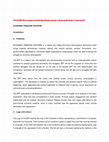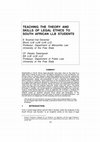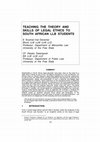Papers by Neels Swanepoel

LitNet Akademies
Die artikel oorweeg die rol van afwykende minderheidsuitsprake in die Suid-Afrikaanse regsbestel.... more Die artikel oorweeg die rol van afwykende minderheidsuitsprake in die Suid-Afrikaanse regsbestel. Dit vind plaas teen die agtergrond van die sogenaamde siviele minagtingsreël wat ingevolge mosie verkry word. Die regspraak in die Konstitusionele Hof tussen die Zondo Kommissie van Ondersoek teen die vorige staatspresident, Jacob Zuma, word as kontekstuele agtergrond gebruik. Daar word na al drie uitsprake verwys en kritiek word uitgespreek teen die bewoording en redevoering in die minderheidsuitsprake wat in die tweede en derde aansoeke gelewer is. Die oplegging van ’n suiwere strafsanksie (onopgeskorte gevangenisstraf) in teenstelling met ’n gebiedende sanksie (wat opgeskorte gevangenisstraf as moontlikheid insluit) word toegelig as die kernverskil in die uitsprake van die meerderheids- en minderheidsuitsprake na die tweede aansoek. Beide die minderheidsuitsprake na die tweede en derde aansoeke word gekritiseer: in die geval van die tweede aansoek, op grond van die woordkeuses en red...

Abstract
The role of dissenting (minority) judgments in the South African legal system with
refer... more Abstract
The role of dissenting (minority) judgments in the South African legal system with
reference to contempt of court in civil context
The article considers the role of dissenting judgments in the South African jurisprudence. The
consideration takes place against the background of the so-called civil contempt of court orders
obtained by litigants by civil motion procedure. It uses the recent Constitutional Court litigation
between the Zondo Commission of Inquiry and the former president of South Africa,
Jacob Zuma as a contextual background. The litigation included two applications by the
commission against Zuma. The first was a successful application to compel his co-operation
with the commission, and the second was to declare him in contempt of court and to order him
to a period of unsuspended (direct) imprisonment. This order was therefore imposing a purely
punitive as opposed to a coercive sanction for his contempt of court. Zuma did not join issue
in the first two applications. After the first application the Constitutional Court issued a
directive to Zuma inviting him to file papers in which he advanced reasons why an order for
his committal should not be made in the event that the court found him in contempt. Again, he
did not avail himself of this opportunity. In the majority judgment in the second application
Khampepe J explained that the purpose of the directive was to afford the respondent the
opportunity to put his case before the court ensuring for him the fairest possible chance
to ensure his fair treatment on par with the fair trial rights in criminal cases as set out in
section 35 of the Constitution. In effect, this measure constituted a development of the common
law procedure relating to civil contempt orders and in particular as to the appropriateness of
imposing direct orders of committal. In a third application Zuma unsuccessfully applied for
the rescission of the court order made in the second application and advanced that the order
had violated his various constitutional rights, constituting “errors” which in terms of the
Constitutional Court rules entitled him to a rescission of the judgment and the order. Except in
the judgment in the first application the Constitutional Court delivered six to two split opinions
in the second and third applications. The litigation with reference to imposing an unsuspended
imprisonment sentence brought on motion was unprecedented in South African jurisprudence
and the majority and minority judgments strongly differed on the appropriateness of a direct
committal sanction. The majority held that the nature of Zuma’s extra-curial contempt of court
was so vehement and persistent that it had no choice but to impose a sentence that would
immediately vindicate the Constitution, the administration of justice and the rule of law.
Imposing a suspended imprisonment sentence according to the majority, would be tantamount
to imposing an ineffective (a brutum fulmen) judgment that would serve no purpose in these
peculiar circumstances. Opposed hereto, the minority held that a coercive sanction by way of
imposing a suspended committal order would be more constitutionally compliant. The minority
judgment (in the second application) reasoned that the civil contempt process, being a hybrid
process of civil and criminal law, ought to ensure the full range of fair trial rights stipulated in
section 35 of the Constitution in criminal cases. The minority stressed that the uniqueness of
the facts of the matter did not justify any possibility of violation of Zuma’s rights, particular
that of his right to freedom guaranteed in section 12 of the Constitution. The minority, however,
failed to contemplate the constitutionality of a process which may have followed if Zuma again
LitNet Akademies Jaargang 19, Nommer 2, 2022, ISSN 1995-5928
https://doi.10.17159/1995-5928/2022/j19n2e1
failed to heed the order to comply with the Commission following upon a coercive order of
suspended committal. While the fact that the court delivered split judgments is nothing
remarkable in South African jurisprudence, the wording of, and the reasoning employed by,
the minority judgments are criticised. This criticism inevitably leads to a revisitation of the
place and the role of minority/dissenting judgments in South African courts. With reference
to local and international sources it is submitted that while there are definite advantages to
dissenting judgments in our constitutional dispensation, caution needs to be exercised in
delivering dissenting judgments, particularly in matters of great public interest and political
sensitivity. This is so that particularly our apex court conveys a uniform message on matters
foundational to our democratic order and achieved through judges deliberating more extensively
before judgments are delivered. It is proposed that a set of four principles ought to be considered
particularly in matters of the degree of public importance and political sensitivity as was the
case in casu: (a) that courts of last instance, mindful that the litigant has no further recourse to
appeal or review processes, must exercise restraint in their different opinions. Judges ought to
be mindful of the political sensitivities involved in matters of high public interest and be
sensitive to the fact that the wording in their judgments should not contribute to public unrest;
(b) that all judgments, particularly dissenting judgments, ought to be written in a spirit of
humility as exemplified by the late Langa CJ, and not in a spirit of self-importance or an attitude
of asserting an individual opinion at all costs; (c) that all of the aforementioned can be achieved
only if judges deliberate extensively in cases of differing opinions among them. It is proposed
that the office of the chief justice publish the manner in which particularly the Constitutional
Court deliberates in cases of dissenting judgments; (d) that judges honour the Constitutional
Court’s own decision to follow its own precedent. The article illustrates how the judge who
delivered the third judgment flagrantly violated this rule of court practice. On the substantive
and procedural aspects of civil contempt of court it is argued that the second judgment of the
Constitutional Court serves as continued recognition of the civil contempt process in South
African law as constitutionally compliant. Further, that the court has developed the common
law to find that a purely punitive sanction in exceptional cases may be appropriate in contempt
of court proceedings brought by motion procedure. A purely punitive sanction will, however,
be justified only on condition that the contemnor is afforded all possible opportunity to advance
reasons why he should not be subjected to any other sanction.
Keywords: civil contempt motions; coercive orders; contempt of court; dissenting judgments;
punitive orders
.

German colonial warfare in then South West Africa between 1904 and 1908 meets the definition of g... more German colonial warfare in then South West Africa between 1904 and 1908 meets the definition of genocide. In this article, the nature and consequences of the war for the mainly affected communities of the Ovaherero and Nama are summarized, followed by the history and meaning of the notion of genocide. But the genocide in the German colony became only since the mid-1960s a matter of scholarly interest. The research results initially remained largely ignored and without major repercussions until the turn of the century. The discourse on genocide and its introduction into a wider German public is presented, leading to developments finally resulting in the official admission of the genocide by the German government in 2015. The subsequent bilateral Namibian-German negotiations over how to come to terms with this shared history are critically assessed. The conclusion seeks to position the efforts of a scholarly engagement with Germany's colonial past in its relevance for today.

Legal writing as a subject has been largely absent from the South African undergraduate LLB curri... more Legal writing as a subject has been largely absent from the South African undergraduate LLB curriculum, despite the fact that every legal practitioner needs to be accomplished in the art of legal writing in some or other form. Literature on current trends in foreign schools of law reveals that a complete or stand-alone course in legal writing is, as a standard procedure, included in the law degree programme. Even though some South African law faculties are yet to respond to this trend, others - including the Faculty of Law at the University of the Free State ("UFS") - have slowly started to include aspects of a potential legal writing course in the broad rubric of a subject known at the UFS as Legal Practice, with some positive results. However, in teaching these courses, it has become apparent that - apart from "practical skills" modules - traditional theory subjects could also play a crucial role in achieving the ideals of teaching effective advocacy in a holistic manner. The debate on how this may be achieved is however noticeably absent from the academic discourse on the general restructuring and transformation of the LLB curriculum. The steps taken by the UFS Faculty of Law to address the teaching vacuum in respect of legal writing and other critical skills are presented in this article. It is aimed at stimulating debate among South African legal academics on the establishment of legal writing courses as core modules in the LLB curriculum. It concludes that, in view of the general under-preparedness of students to study law, the "staggered" introduction of components of legal writing into the LLB curriculum can possibly provide some solutions.
This article is based on a Masters dissertation submitted at the University of the Free State-Blo... more This article is based on a Masters dissertation submitted at the University of the Free State-Bloemfontein by Inez Bezuidenhout under the study guidance of Prof Neels Swanepoel. 1 The University of the Free State, choose in Afrikaans the expression "samelewingsdiens" over "gemeenskapsdiens" because the former is more inclusive. See de Beer "Samelewingsdiensleer in hoër onderwys: Afrikaans vir nie moedertaalsprekers" 2010 Tydskrif vir Taalonderrig 24.
Journal for Juridical Science, 2020

Law, Democracy and Development, 2021
Drawing on both legal and political sources, this article scrutinises the policy of cadre deploym... more Drawing on both legal and political sources, this article scrutinises the policy of cadre deployment that the African National Congress (ANC), the ruling party in South Africa, has implemented, and continues to apply. The analysis begins by recalling and commenting on the only reported judgment in South African jurisprudence that dealt with the political influencing of municipalities' exercise of their public power to make appointments, namely, Mlokoti v Amathole District Municipality & another 2009 (6) SA 354 (ECD). What the Mlokoti case has confirmed is that the legal foundation for the exercise of public power is found in the Constitution and its enabling legislation, and not in party political policy, such as the ongoing practice of cadre deployment. In an investigation of cadre deployment, the article then demonstrates that this ANC policy, particularly judging by its stated purpose, is incompatible with the constitutional State and, instead, enables the rise of the shadow ...

Obiter
Stakeholders in South African legal education have been clear on the need for a legal ethics modu... more Stakeholders in South African legal education have been clear on the need for a legal ethics module as part of the LLB degree programme. In this contribution, the authors draw on relevant literature, particularly regarding the American experience, as well as their own observations as legal practitioners and lecturers to advance the conceptualization, design and presentation of such a potential fully-fledged legal ethics module (or modules). Some reflections on the conceptual points of departure for a legal ethics module are followed by a discussion of the more pragmatic aspects associated with legal ethics teaching, namely the goals and objectives pursued (the “what and why”) and the methods used (the “where, when and how”). The article argues that although a stand-alone module is urgently needed, legal ethics need not be taught in isolation, but should ideally be incorporated throughout the curriculum using a mixed-method approach. Such an approach will inculcate in students the re...
Obiter
Students are generally unprepared to study law. Unpreparedness includes language and writing defi... more Students are generally unprepared to study law. Unpreparedness includes language and writing deficiencies. Legal-writing courses at law school only lay the foundation for these skills that have to be developed and improved over many years of practice. Law schools and the organized profession should accept joint responsibility for laying this foundation. A substantial part of most legal-writing courses must include language training. Legal writing is generally not regarded as necessary by many South African law faculties. The main challenge in the area of developing legal-writing courses in South Africa involves the fact that legal academics have not beenformally trained to teach language and writing. It is proposed that a course is introduced for law teachers in and that they undergo training that will enable law lecturers to present these courses themselves.

Journal for Jurisdical Science, 2020
Over the past few years, the series of cases implicating Advocates Jiba and Mrwebi, two erstwhile... more Over the past few years, the series of cases implicating Advocates Jiba and Mrwebi, two erstwhile senior members of the office of the National Director of Public Prosecutions (NDPP), have received extensive media coverage. The advocates are alleged to have been politically influenced in the exercise of their public power. In mid-2019, the Constitutional Court’s ruling in General Council of the Bar of South Africa v Jiba and others 2019 8 BCLR 919 (CC), namely that the General Council of the Bar (GCB) had failed to show why the matter fell within the jurisdiction of the Constitutional Court for its consideration, disappointed many. This meant that the Supreme Court of Appeal’s (SCA) majority judgment – which had overturned the Gauteng High Court’s decision that Jiba and Mrwebi were to be removed from the roll of advocates – stood, pending a parliamentary process following upon the findings of the Mogoro Commission of Inquiry into their fitness as advocates. Reflecting on the jurispru...

Suid-Afrikaanse regspraak en literatuur is ongelukkig vol voorbeelde van onvleiende opmerkings va... more Suid-Afrikaanse regspraak en literatuur is ongelukkig vol voorbeelde van onvleiende opmerkings van staatsoptrede wat teen die Grondwet indruis. Met die dat Suid-Afrika 'n jong konstitusionele staat is, word gepaste regshulp in gevalle van ongrondwetlike optrede nog ontwikkel. Hierdie ontwikkeling sal uiteraard 'n stapsgewyse en uitgerekte proses wees. Hierdie artikel beklemtoon dat die gestruktureerde interdik, wat sy ontstaan in die VSA gehad het, 'n belangrike rol kan speel om toepaslike grondwetlike remedies te skep waar grondwetlike regte geskend word. Daar kan verwag word dat veral weerbare litigante of groepe litigante in Suid-Afrika die remedie toenemend sal gebruik om regshulp as gevolg van ongrondwetlike staats- of regeringsoptrede te bekom. Die artikel ondersoek die gestruktureerde interdik - van die ontstaan, aard, normatiewe raamwerk vir die bestaan daarvan in die Suid-Afrikaanse reg, die Amerikaanse beregtingsmodelle, tot die hoofstruikelblokke in die toesta...

SUMMARY Stakeholders in South African legal education have been clear on the need for a legal eth... more SUMMARY Stakeholders in South African legal education have been clear on the need for a legal ethics module as part of the LLB degree programme. In this contribution, the authors draw on relevant literature, particularly regarding the American experience, as well as their own observations as legal practitioners and lecturers to advance the conceptualization, design and presentation of such a potential fully-fledged legal ethics module (or modules). Some reflections on the conceptual points of departure for a legal ethics module are followed by a discussion of the more pragmatic aspects associated with legal ethics teaching, namely the goals and objectives pursued (the " what and why ") and the methods used (the " where, when and how "). The article argues that although a stand-alone module is urgently needed, legal ethics need not be taught in isolation, but should ideally be incorporated throughout the curriculum using a mixed-method approach. Such an approach w...

Die instelling van 'n grondwetlike staatsbestel in Suid-Afrika het verreikende gevolge gehad ... more Die instelling van 'n grondwetlike staatsbestel in Suid-Afrika het verreikende gevolge gehad - onder meer vir die siviele prosesreg - veral met artikel 38 van die Grondwet wat 'n gelyste klas persone en "'n vereniging wat in die belang van sy lede optree" in staat stel "om 'n bevoegde hof te nader en aan te voer dat daar op 'n reg in die handves van regte inbreuk gemaak is of dat so 'n inbreukmaking dreig" ten einde so gepaste regshulp te bekom. Tog word weinig aandag daaraan geskenk of gewone Suid-Afrikaanse burgers altyd oor die middele beskik om hul regte ingevolge artikel 38 af te dwing, en - selfs al slaag hul aksies, veral teen 'n staatsliggaam - of die vereiste regsverligting ooit sal realiseer. The interpretational broadening of the common-law requirements of locus standi in iudicio in public and own-interest constitutional actions : a necessary development by the South African courts Section 38 of the Constitution, particularl...
Law Democracy+Development, 2021
Drawing on both legal and political sources, this article scrutinises the policy of cadre deploym... more Drawing on both legal and political sources, this article scrutinises the policy of cadre deployment that the African National Congress (ANC), the ruling party in South Africa, has implemented, and continues to apply. The analysis begins by recalling and commenting on the only reported judgment in South African jurisprudence that dealt with the political influencing of municipalities' exercise of their public power to make appointments, namely, Mlokoti v LAW DEMOCRACY & DEVELOPMENT

The place and authority of international law in South African domestic law, with reference to the... more The place and authority of international law in South African domestic law, with reference to the Glenister judgement Since 1994 in particular, South Africa has been incurring several obligations in terms of international law. This raises the question of the place and authority of international law in the domestic law of the country. An important example of where a South African court had to consider this question was Glenister v President of the Republic of South Africa. In this case the constitutional court had to take into account, inter alia, the United Nations convention against corruption in order to come to the conclusion that the controversial legislation that had turned the highly successful elite crime unit, the Scorpions, into the Hawks was unconstitutional and invalid. Both the minority and majority judgements in Glenister paid considerable attention to the role, place and authority of international law in South African domestic law. However, they did so in essentially d...

Although many different forms of assessment can be successfully applied in clinical legal educati... more Although many different forms of assessment can be successfully applied in clinical legal education (CLE), this article particularly focuses on the use of reflective journals as an assessment tool that, in the authors' view, is well placed for use in CLE courses. Prior to discussing this particular assessment tool, however, certain general parameters within which assessment takes place will be explored. Refleksiejoernale as 'n assesseringsmetode in kliniese regsopleiding Almal is dit eens dat die kliniese regsopleidingskursus nougeset geassesseer moet word indien dit kredietdraend is vir die verwerwing van die LLB-graad. Alhoewel verskeie vorme van assessering met welslae in kliniese regsopleiding toegepas kan word, konsentreer hierdie artikel bepaald op die gebruik van oordenkingsjoernale as assesseringsmetode. As agtergrond word daar eerstens in die bree tussen formatiewe en summatiewe assessering onderskei, waarna die riglyne vir assessering en puntetoekenning sowel as st...

Onlangse gebeure - veral die Noord-Gautengse hoe hof se tersydestelling van die Suid-Afrikaanse n... more Onlangse gebeure - veral die Noord-Gautengse hoe hof se tersydestelling van die Suid-Afrikaanse nasionale direkteur van openbare vervolging en die Suid-Afrikaanse Polisiediens se besluit om nie misdade teen die mensdom wat Zimbabwiese burgers in 2007 in Zimbabwe gepleeg het, te ondersoek nie - vorm die agtergrond vir hierdie artikel oor die Wet op die Implementering van die Statuut van Rome oor die Internasionale Strafhof 27 van 2002 ("die Implementeringswet") en die implikasies van sodanige implementeringswetgewing vir lidstate van die internasionale strafhof ("die hof"). Aangesien die hof self slegs oor aanvullendheidsjurisdiksie beskik en dus net kan optree indien die veiligheidsraad of 'n lidstaat hom so versoek, of 'n lidstaat self nie vervolging wil of kan instel nie, verplig dit lidstate van die hof om universele jurisdiksie uit te oefen en plegers van internasionale misdaad nasionaal te vervolg. In Suid-Afrikaanse verband het die uitvaardiging van...
Students are generally unprepared to study law. Unpreparedness includes language and writing defi... more Students are generally unprepared to study law. Unpreparedness includes language and writing deficiencies. Legal-writing courses at law school only lay the foundation for these skills that have to be developed and improved over many years of practice. Law schools and the organized profession should accept joint responsibility for laying this foundation. A substantial part of most legal-writing courses must include language training. Legal writing is generally not regarded as necessary by many South African law faculties. The main challenge in the area of developing legal-writing courses in South Africa involves the fact that legal academics have not been formally trained to teach language and writing. It is proposed that a course is introduced for law teachers in and that they undergo training that will enable law lecturers to present these courses themselves.

Suid-Afrikaanse regspraak en literatuur is ongelukkig vol voorbeelde van onvleiende opmerkings va... more Suid-Afrikaanse regspraak en literatuur is ongelukkig vol voorbeelde van onvleiende opmerkings van staatsoptrede wat teen die Grondwet indruis. Met die dat Suid-Afrika 'n jong konstitusionele staat is, word gepaste regshulp in gevalle van ongrondwetlike optrede nog ontwikkel. Hierdie ontwikkeling sal uiteraard 'n stapsgewyse en uitgerekte proses wees. Hierdie artikel beklemtoon dat die gestruktureerde interdik, wat sy ontstaan in die VSA gehad het, 'n belangrike rol kan speel om toepaslike grondwetlike remedies te skep waar grondwetlike regte geskend word. Daar kan verwag word dat veral weerbare litigante of groepe litigante in Suid-Afrika die remedie toenemend sal gebruik om regshulp as gevolg van ongrondwetlike staats- of regeringsoptrede te bekom. Die artikel ondersoek die gestruktureerde interdik - van die ontstaan, aard, normatiewe raamwerk vir die bestaan daarvan in die Suid-Afrikaanse reg, die Amerikaanse beregtingsmodelle, tot die hoofstruikelblokke in die toesta...











Uploads
Papers by Neels Swanepoel
The role of dissenting (minority) judgments in the South African legal system with
reference to contempt of court in civil context
The article considers the role of dissenting judgments in the South African jurisprudence. The
consideration takes place against the background of the so-called civil contempt of court orders
obtained by litigants by civil motion procedure. It uses the recent Constitutional Court litigation
between the Zondo Commission of Inquiry and the former president of South Africa,
Jacob Zuma as a contextual background. The litigation included two applications by the
commission against Zuma. The first was a successful application to compel his co-operation
with the commission, and the second was to declare him in contempt of court and to order him
to a period of unsuspended (direct) imprisonment. This order was therefore imposing a purely
punitive as opposed to a coercive sanction for his contempt of court. Zuma did not join issue
in the first two applications. After the first application the Constitutional Court issued a
directive to Zuma inviting him to file papers in which he advanced reasons why an order for
his committal should not be made in the event that the court found him in contempt. Again, he
did not avail himself of this opportunity. In the majority judgment in the second application
Khampepe J explained that the purpose of the directive was to afford the respondent the
opportunity to put his case before the court ensuring for him the fairest possible chance
to ensure his fair treatment on par with the fair trial rights in criminal cases as set out in
section 35 of the Constitution. In effect, this measure constituted a development of the common
law procedure relating to civil contempt orders and in particular as to the appropriateness of
imposing direct orders of committal. In a third application Zuma unsuccessfully applied for
the rescission of the court order made in the second application and advanced that the order
had violated his various constitutional rights, constituting “errors” which in terms of the
Constitutional Court rules entitled him to a rescission of the judgment and the order. Except in
the judgment in the first application the Constitutional Court delivered six to two split opinions
in the second and third applications. The litigation with reference to imposing an unsuspended
imprisonment sentence brought on motion was unprecedented in South African jurisprudence
and the majority and minority judgments strongly differed on the appropriateness of a direct
committal sanction. The majority held that the nature of Zuma’s extra-curial contempt of court
was so vehement and persistent that it had no choice but to impose a sentence that would
immediately vindicate the Constitution, the administration of justice and the rule of law.
Imposing a suspended imprisonment sentence according to the majority, would be tantamount
to imposing an ineffective (a brutum fulmen) judgment that would serve no purpose in these
peculiar circumstances. Opposed hereto, the minority held that a coercive sanction by way of
imposing a suspended committal order would be more constitutionally compliant. The minority
judgment (in the second application) reasoned that the civil contempt process, being a hybrid
process of civil and criminal law, ought to ensure the full range of fair trial rights stipulated in
section 35 of the Constitution in criminal cases. The minority stressed that the uniqueness of
the facts of the matter did not justify any possibility of violation of Zuma’s rights, particular
that of his right to freedom guaranteed in section 12 of the Constitution. The minority, however,
failed to contemplate the constitutionality of a process which may have followed if Zuma again
LitNet Akademies Jaargang 19, Nommer 2, 2022, ISSN 1995-5928
https://doi.10.17159/1995-5928/2022/j19n2e1
failed to heed the order to comply with the Commission following upon a coercive order of
suspended committal. While the fact that the court delivered split judgments is nothing
remarkable in South African jurisprudence, the wording of, and the reasoning employed by,
the minority judgments are criticised. This criticism inevitably leads to a revisitation of the
place and the role of minority/dissenting judgments in South African courts. With reference
to local and international sources it is submitted that while there are definite advantages to
dissenting judgments in our constitutional dispensation, caution needs to be exercised in
delivering dissenting judgments, particularly in matters of great public interest and political
sensitivity. This is so that particularly our apex court conveys a uniform message on matters
foundational to our democratic order and achieved through judges deliberating more extensively
before judgments are delivered. It is proposed that a set of four principles ought to be considered
particularly in matters of the degree of public importance and political sensitivity as was the
case in casu: (a) that courts of last instance, mindful that the litigant has no further recourse to
appeal or review processes, must exercise restraint in their different opinions. Judges ought to
be mindful of the political sensitivities involved in matters of high public interest and be
sensitive to the fact that the wording in their judgments should not contribute to public unrest;
(b) that all judgments, particularly dissenting judgments, ought to be written in a spirit of
humility as exemplified by the late Langa CJ, and not in a spirit of self-importance or an attitude
of asserting an individual opinion at all costs; (c) that all of the aforementioned can be achieved
only if judges deliberate extensively in cases of differing opinions among them. It is proposed
that the office of the chief justice publish the manner in which particularly the Constitutional
Court deliberates in cases of dissenting judgments; (d) that judges honour the Constitutional
Court’s own decision to follow its own precedent. The article illustrates how the judge who
delivered the third judgment flagrantly violated this rule of court practice. On the substantive
and procedural aspects of civil contempt of court it is argued that the second judgment of the
Constitutional Court serves as continued recognition of the civil contempt process in South
African law as constitutionally compliant. Further, that the court has developed the common
law to find that a purely punitive sanction in exceptional cases may be appropriate in contempt
of court proceedings brought by motion procedure. A purely punitive sanction will, however,
be justified only on condition that the contemnor is afforded all possible opportunity to advance
reasons why he should not be subjected to any other sanction.
Keywords: civil contempt motions; coercive orders; contempt of court; dissenting judgments;
punitive orders
.
The role of dissenting (minority) judgments in the South African legal system with
reference to contempt of court in civil context
The article considers the role of dissenting judgments in the South African jurisprudence. The
consideration takes place against the background of the so-called civil contempt of court orders
obtained by litigants by civil motion procedure. It uses the recent Constitutional Court litigation
between the Zondo Commission of Inquiry and the former president of South Africa,
Jacob Zuma as a contextual background. The litigation included two applications by the
commission against Zuma. The first was a successful application to compel his co-operation
with the commission, and the second was to declare him in contempt of court and to order him
to a period of unsuspended (direct) imprisonment. This order was therefore imposing a purely
punitive as opposed to a coercive sanction for his contempt of court. Zuma did not join issue
in the first two applications. After the first application the Constitutional Court issued a
directive to Zuma inviting him to file papers in which he advanced reasons why an order for
his committal should not be made in the event that the court found him in contempt. Again, he
did not avail himself of this opportunity. In the majority judgment in the second application
Khampepe J explained that the purpose of the directive was to afford the respondent the
opportunity to put his case before the court ensuring for him the fairest possible chance
to ensure his fair treatment on par with the fair trial rights in criminal cases as set out in
section 35 of the Constitution. In effect, this measure constituted a development of the common
law procedure relating to civil contempt orders and in particular as to the appropriateness of
imposing direct orders of committal. In a third application Zuma unsuccessfully applied for
the rescission of the court order made in the second application and advanced that the order
had violated his various constitutional rights, constituting “errors” which in terms of the
Constitutional Court rules entitled him to a rescission of the judgment and the order. Except in
the judgment in the first application the Constitutional Court delivered six to two split opinions
in the second and third applications. The litigation with reference to imposing an unsuspended
imprisonment sentence brought on motion was unprecedented in South African jurisprudence
and the majority and minority judgments strongly differed on the appropriateness of a direct
committal sanction. The majority held that the nature of Zuma’s extra-curial contempt of court
was so vehement and persistent that it had no choice but to impose a sentence that would
immediately vindicate the Constitution, the administration of justice and the rule of law.
Imposing a suspended imprisonment sentence according to the majority, would be tantamount
to imposing an ineffective (a brutum fulmen) judgment that would serve no purpose in these
peculiar circumstances. Opposed hereto, the minority held that a coercive sanction by way of
imposing a suspended committal order would be more constitutionally compliant. The minority
judgment (in the second application) reasoned that the civil contempt process, being a hybrid
process of civil and criminal law, ought to ensure the full range of fair trial rights stipulated in
section 35 of the Constitution in criminal cases. The minority stressed that the uniqueness of
the facts of the matter did not justify any possibility of violation of Zuma’s rights, particular
that of his right to freedom guaranteed in section 12 of the Constitution. The minority, however,
failed to contemplate the constitutionality of a process which may have followed if Zuma again
LitNet Akademies Jaargang 19, Nommer 2, 2022, ISSN 1995-5928
https://doi.10.17159/1995-5928/2022/j19n2e1
failed to heed the order to comply with the Commission following upon a coercive order of
suspended committal. While the fact that the court delivered split judgments is nothing
remarkable in South African jurisprudence, the wording of, and the reasoning employed by,
the minority judgments are criticised. This criticism inevitably leads to a revisitation of the
place and the role of minority/dissenting judgments in South African courts. With reference
to local and international sources it is submitted that while there are definite advantages to
dissenting judgments in our constitutional dispensation, caution needs to be exercised in
delivering dissenting judgments, particularly in matters of great public interest and political
sensitivity. This is so that particularly our apex court conveys a uniform message on matters
foundational to our democratic order and achieved through judges deliberating more extensively
before judgments are delivered. It is proposed that a set of four principles ought to be considered
particularly in matters of the degree of public importance and political sensitivity as was the
case in casu: (a) that courts of last instance, mindful that the litigant has no further recourse to
appeal or review processes, must exercise restraint in their different opinions. Judges ought to
be mindful of the political sensitivities involved in matters of high public interest and be
sensitive to the fact that the wording in their judgments should not contribute to public unrest;
(b) that all judgments, particularly dissenting judgments, ought to be written in a spirit of
humility as exemplified by the late Langa CJ, and not in a spirit of self-importance or an attitude
of asserting an individual opinion at all costs; (c) that all of the aforementioned can be achieved
only if judges deliberate extensively in cases of differing opinions among them. It is proposed
that the office of the chief justice publish the manner in which particularly the Constitutional
Court deliberates in cases of dissenting judgments; (d) that judges honour the Constitutional
Court’s own decision to follow its own precedent. The article illustrates how the judge who
delivered the third judgment flagrantly violated this rule of court practice. On the substantive
and procedural aspects of civil contempt of court it is argued that the second judgment of the
Constitutional Court serves as continued recognition of the civil contempt process in South
African law as constitutionally compliant. Further, that the court has developed the common
law to find that a purely punitive sanction in exceptional cases may be appropriate in contempt
of court proceedings brought by motion procedure. A purely punitive sanction will, however,
be justified only on condition that the contemnor is afforded all possible opportunity to advance
reasons why he should not be subjected to any other sanction.
Keywords: civil contempt motions; coercive orders; contempt of court; dissenting judgments;
punitive orders
.